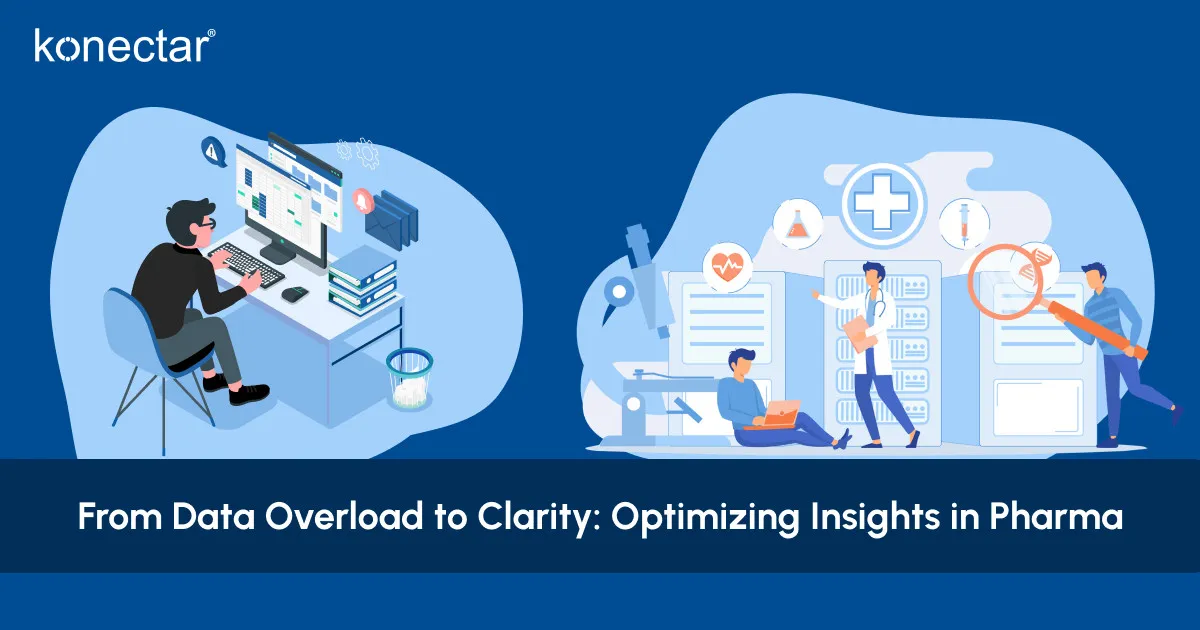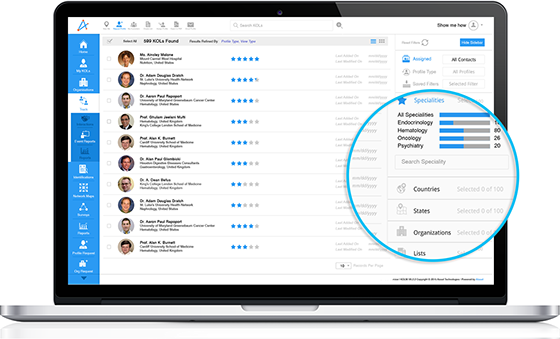07-11-2024
From Data Overload to Clarity: Optimizing Insights in Pharma

Digitalization has had an unprecedented impact on the pharma industry. Most operations rely on the availability of data and its accurate analysis. This data holds the potential to shape healthcare outcomes, but effectively managing it poses a significant challenge for pharma companies.
In this article:
- Key Data Sources Driving Data Surge in Pharma
- Insight Management as a Solution
- Strategies for Implementing Insight Management Tools
- Common Pitfalls to Avoid
- Final Thoughts
- FAQs
The sheer volume of data can be overwhelming, especially since it is constantly being collected from multiple sources. This is sometimes referred to as data overload. It can obscure vital pharma insights and hinder the decision-making process. By implementing nuanced insight management tools, organizations can sift through the noise to find the information that matters, leading to effective use of information.
Key Data Sources Driving Data Surge in Pharma
Clinical Trials
The data from clinical trials is foundational for pharma companies. Each trial, with its multiple phases, involves hundreds to thousands of participants. This data includes demographic details, health metrics, test results, side effects, and treatment outcomes.
In addition, trials generate both structured and unstructured data, which necessitates the use of insight management tools.
Certain trials take place on a global level, which multiplies the amount of data generated. Some trials span over several years. Longitudinal data brings an added challenge as the information must be updated to maintain accuracy.
Electronic Health Records (EHR)
EHRs are detailed patient records. These include medical history, diagnostics, treatment plans, and outcomes. EHRs can serve as repositories of pharma insights. However, they also add complexity due to their unstructured nature. This data also needs to comply with privacy norms and regulations.
Insights from this data can be invaluable in supporting other research initiatives, but integrating them with data streams can pose a significant challenge.
Social Media
Social platforms are accruing relevant data that can be used for marketing, engagement, and post-marketing surveillance. Top pharmaceutical companies continuously monitor social media platforms to ascertain public perception of their drugs.
The nature of data being informal and unstructured is another challenge for pharma companies.
Patient Feedback
Pharma companies are increasingly focusing on feedback from patients. Collecting, managing, and analyzing this information leads to data overload as data-driven and patient-centric approaches are gaining more popularity.
Insight Management as a Solution
Business Intelligence (BI) software are tools and systems that allow organizations to collect, store, and analyze data to assist decision-making. These systems are designed to handle large volumes of unstructured data to create strategic business opportunities.
BI Software helps sift through vast amounts of data to find actionable insights.
Streamlined Data Analytics
Insight management software automates the process of data collection, organizing, and analysis. Automation helps reduce the time and effort and minimizes the risks associated with manual data handling.
Additionally, this software has advanced analytical capabilities built with machine learning algorithms that can process large datasets and identify patterns and trends that might be overlooked during manual inspection.
Enhancing Data Accessibility and Usability
Insight software offers a centralized platform where data can be integrated from multiple sources. This allows for cross-team collaboration, speeding up the decision-making process. User-friendly interfaces allow nontechnical staff to conduct complex analyses successfully. Visualizing the data makes it much simpler to navigate and derive insights.
Additionally, this software has advanced analytical capabilities built with machine learning algorithms that can process large datasets and identify patterns and trends that might be overlooked during manual inspection.
Ensuring Scalability and Adaptability
For any organization, failing to consider future growth can result in performance issues and higher costs down the line.
As organizations grow, so does the data they generate. Insight management software is scalable and designed to handle increasing volumes of data without losing performance.
Strategies for Implementing Insight Management Tools
Choosing and implementing the right insight management tool requires a tailored approach specific to an organization’s needs and challenges.
Assessing Organizational Needs
Identifying the major challenges and pain points is the first step to choosing an insight management tool. This could be due to data silos, delayed reporting, or lack of real-time data. Based on the needs assessment, a need for features in the insight management tool can be compiled.
Selecting the Right Tool
The right insight tool must be compatible with existing IT infrastructure and handle the volume and variety of data an organization deals with. Any staff training must also be considered. Compliance measures must also be kept in mind.
Common Pitfalls to Avoid
While insight management tools offer several benefits, there are common pitfalls to avoid to increase the chances of success.
Poor Data Quality
Data acts as an essential backbone of business. When data quality is compromised, it can lead to errors in conclusion and ultimately lead to the development of incomplete strategies. Common data issues include inaccurate, incomplete, inconsistent, and outdated data.
Lack of Clear Objectives
Marketing efforts can lead to wasted resources and unmet expectations without adequate need analysis and well-defined goals. The consequences of unclear objectives can be difficulty in measuring success and insufficient resource allocation.
Final Thoughts
In this digital era, technology is transforming the pharma industry at an unprecedented pace. By addressing the common pitfalls, there is an immense potential for enhanced patient outcomes and industry-wide advancements.
Potential for Improved Patient Outcomes
The final goal of any healthcare initiative is to improve patient outcomes. By moving from data overload to data clarity, pharma companies can make informed decisions, enhance treatment outcomes, reduce adverse effects, and lead to increased patient engagement.
Data clarity derived from well-managed data can help tailor therapies to patients, help in faster diagnosis and treatment, and lead to a reduction in medical errors. Effective use of data can also drive medical research forward, resulting in innovation.
Industry Advancement
Effective data management can accelerate R&D efforts by providing quick access to historical data. Automation helps identify repetitive tasks that can free up human resources to more strategic roles. Harnessing the efficiency of automation also allows top pharmaceutical companies to respond quickly to market changes and customer needs, ensuring that they maintain their competitive edge.
FAQs
- What is data overload in pharma companies?
Data overload in pharmaceutical companies refers to an overwhelming amount of data generated throughout different forms of product lifecycle.
- What are some of the sources of data overload in pharma companies?
The primary source of data overload in pharma companies comes from clinical trials. Other sources include EHRs, social media, and patient feedback.
- How does Business Intelligence software help overcome data overload?
BI software is designed to handle vast amounts of data sets generated throughout the product lifecycle by transforming the raw data into meaningful insights.
- What are some of the strategies for implementing insight management tools?
Common strategies to remember are organizational needs and the existing IT infrastructure.
- What are the common pitfalls to avoid while implementing an insight management tool?
Poor data quality and lack of clear objectives should be avoided while implementing an insight management tool.





